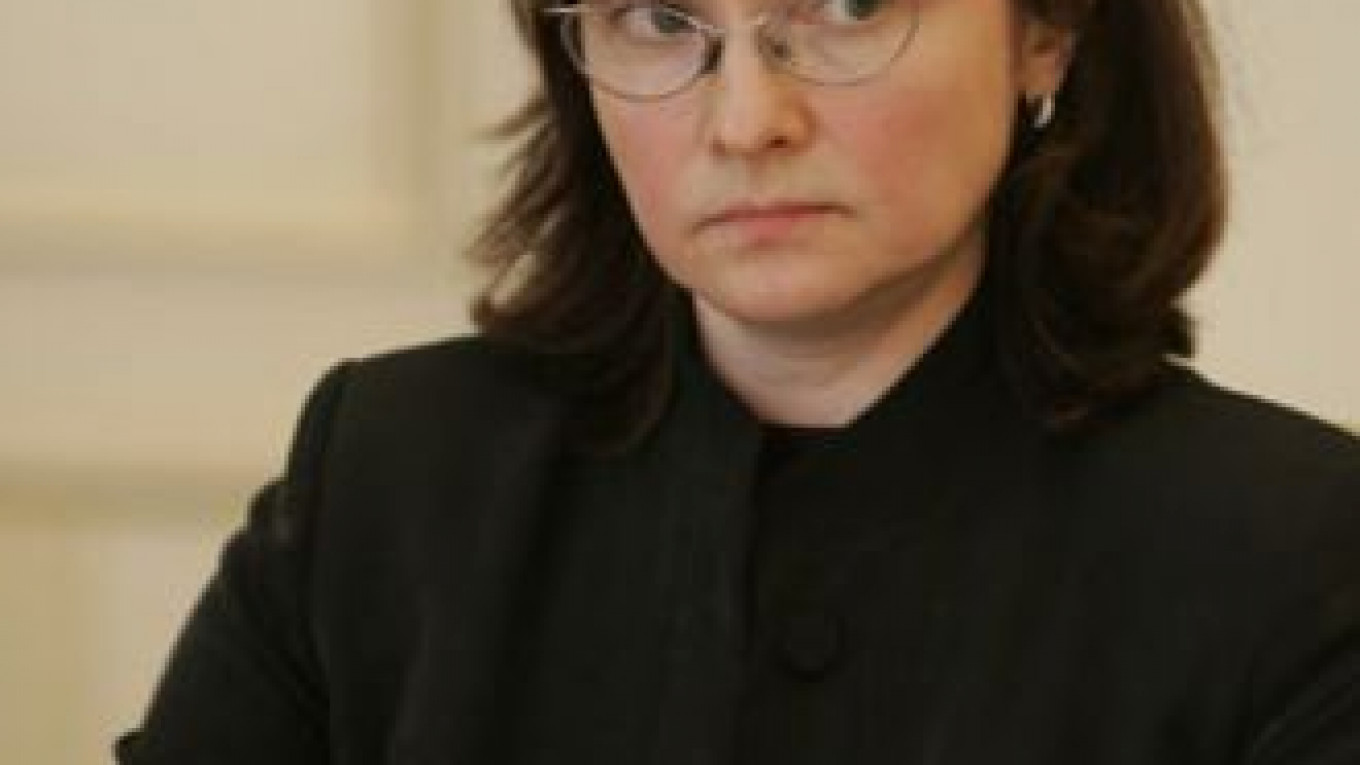ST. PETERSBURG — Launching a new state procurement website last year apparently resulted in one federal official not getting luxury furniture, but it was crucial for ensuring more transparency in relations between authorities and the populace.
And that, Kremlin aide Elvira Nabiullina said, should be a cornerstone of a new system of governance.
"The governance model is in crisis; we all understand this," she told a panel session at the St. Petersburg International Economic Forum on Friday.
Having acknowledged the need for changes, she called for more transparency to improve people's trust in the government.
"Ensuring transparency will create an atmosphere of trust, where society understands what the authorities do. Trust is a key indicator of the legitimacy of the governance system," Nabiullina said.
The session attendees, who included business leaders like president of Troika Dialog Ruben Vardanyan and politicians like Ulyanovsk governor Sergei Morozov, were unanimous in acknowledging the need to change the current governance model.
Furthermore, 71.1 percent of them said there is a clear conflict between the fast-changing world and the old way of management.
As one example of transparency, Nabiullina mentioned the launch of the state procurement website, since "people want to know where the taxpayers' money goes".
After the launch of the website, "the most odious cases of purchases were questioned," Nabiullina said, prompting a reaction from Sberbank president German Gref, who moderated the session.
"I know that you didn't allow the purchase of gilded furniture for the dacha of one of the respected ministers," he said.
"Well, I shouldn't get the credit; it's thanks to transparency and openness," Nabiullina answered with a smile.
Gref might have been referring to the cancellation of a tender to supply a hand-carved gilded bed, reportedly intended for one of the Interior Ministry residences.
The other panelists were Alexander Oslon, president of Public Opinion Foundation; Tim Kelsey, a British government official in charge of transparency and open data; and HYPERLINK "https://post5.imedia.ru/exchweb/bin/redir.asp?URL=http://2012.forumspb.com/"
_blankAndrei Shleifer, professor of economics at Harvard University.
The members of the panel said that one reason for the governance crisis is rapid changes in society.
Gref said those changes occur both in politics and in the economy, adding that things had been much more predictable in the past.
He said that sometimes nostalgia causes people to dream of the past, when business forecasts could be made 50 years ahead based on stable prices for wheat.
"And now, when shares of the most solid blue chip in the country, with a trading volume of $1 billion, called Sberbank, are being shaken 5 to 6 percent a day, you start thinking about what kind of world we live in," he said.
A growing level of education results in people having higher expectations and demanding a better quality of life, while the authorities have yet to catch up to meet those demands, Nabiullina said.
She added that one measure to resolve the crisis is to get people involved in the decision-making process.
But while Nabiullina spoke diplomatically, Gref was far more blunt.
"We are tired of waiting for prosperity from the politicians for whom we once voted and who must make a miracle for us over four, five or six years, while we can only sit and tell jokes in the kitchen and can't affect the decisions being made," he said. "The middle class wants to take initiative, and it gets irritated when it sees that those elected don't act in its interests."
There was one point on which Nabiullina and Gref disagreed. Nabiullina said that achieving a greater level of transparency is partly possible through social networks. Gref argued that politicians should stay away from the Internet, which he thinks disturbs the governing process.
"Any serving politician is afraid of the Internet," he said, adding that he would propose a law forbidding politicians to use the Internet.
He said all leaders, including U.S. President Barack Obama, German Chancellor Angela Merkel and Russian President Vladimir Putin, read negative feedback posted by citizens, since "politicians are, as a rule, not well-liked."
This in turn makes them "upset" and "interferes with the process of stable governing," he said.
Unlike presidential predecessor Dmitry Medvedev, an avid Twitter user, Putin doesn't employ any new technologies in his everyday life, having once confessed that he doesn't even use a cell phone.
But Oslon said that keeping politicians informed about public opinion through the Internet "is what transparency means."
People discussed politicians even before the development of the Internet, "but they were doing it in the kitchens," so politicians weren't aware of what they were saying, Oslon said.
"It's a surprise for them," he said. "They have to get used to this new situation of transparency."
A Message from The Moscow Times:
Dear readers,
We are facing unprecedented challenges. Russia's Prosecutor General's Office has designated The Moscow Times as an "undesirable" organization, criminalizing our work and putting our staff at risk of prosecution. This follows our earlier unjust labeling as a "foreign agent."
These actions are direct attempts to silence independent journalism in Russia. The authorities claim our work "discredits the decisions of the Russian leadership." We see things differently: we strive to provide accurate, unbiased reporting on Russia.
We, the journalists of The Moscow Times, refuse to be silenced. But to continue our work, we need your help.
Your support, no matter how small, makes a world of difference. If you can, please support us monthly starting from just $2. It's quick to set up, and every contribution makes a significant impact.
By supporting The Moscow Times, you're defending open, independent journalism in the face of repression. Thank you for standing with us.
Remind me later.






